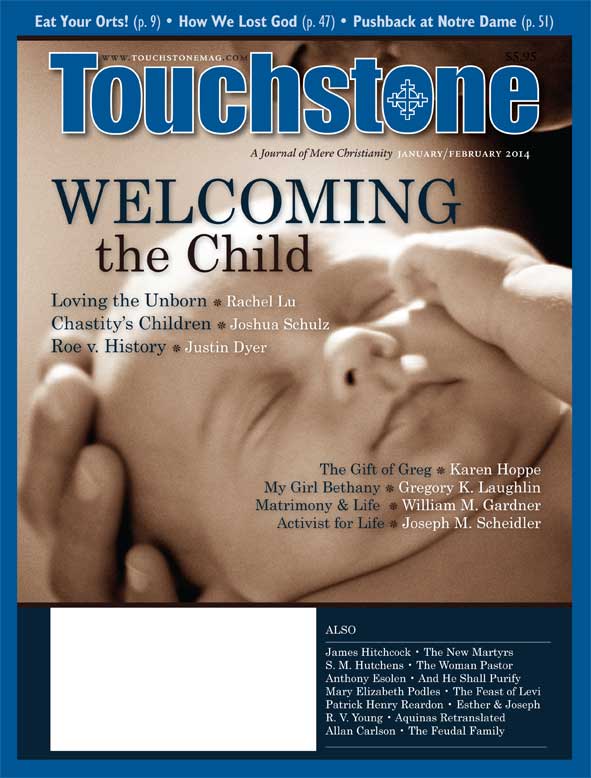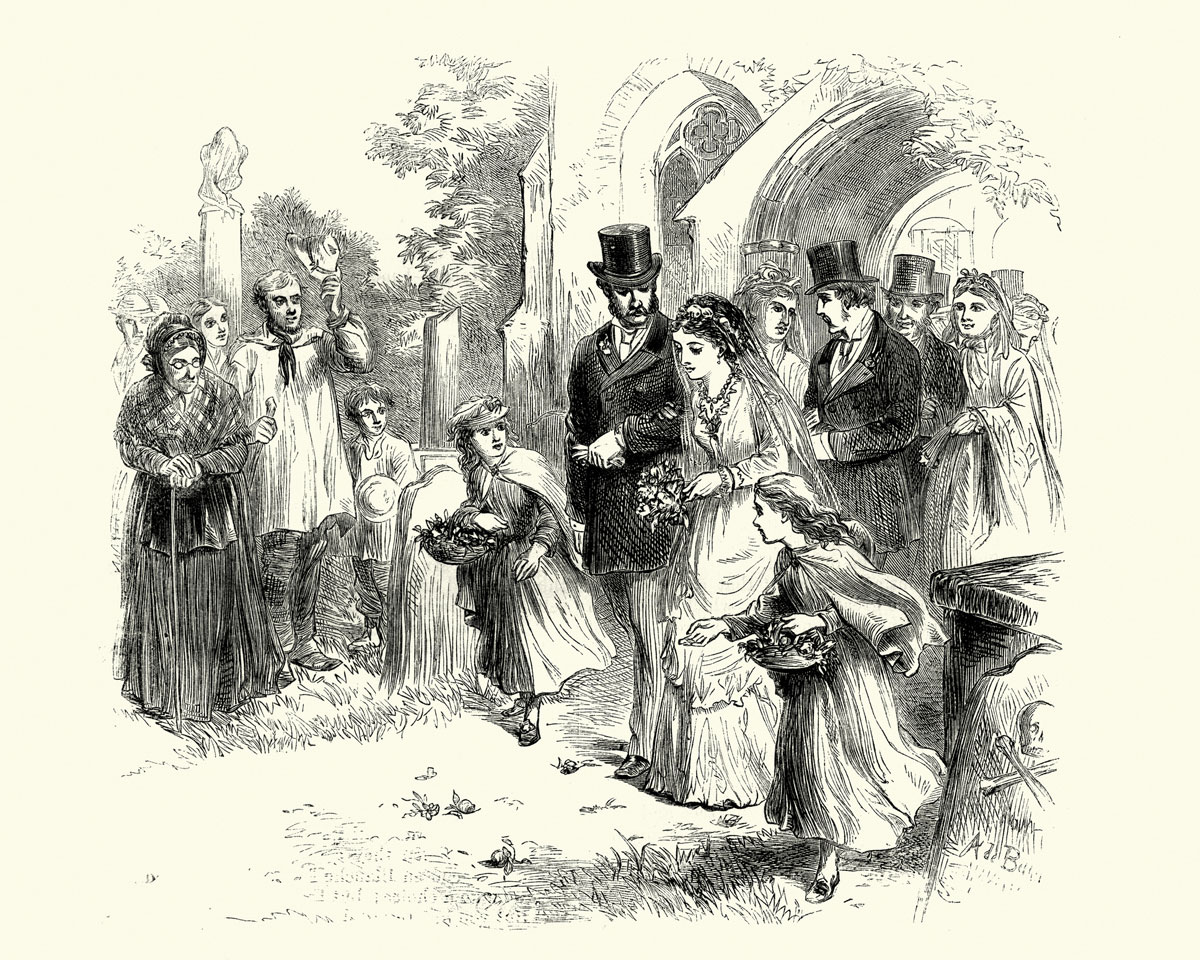Chastity's Children
Sexual Reality, Procreation & the Wisdom of Virtuous Love
Every spring I teach an undergraduate course on the seven holy virtues and the seven deadly sins in Aquinas and Dante's Divina Commedia. For many students, getting their minds around the subject is like trying to speak with marbles in their mouths. Their moral vocabulary is limited to the simplistic terms of the individualistic discourse presently dominating our culture: freedom and harm. They mostly avoid evaluating actions as right or wrong by saying, "Well, that's their choice!"—as if moral problems were all matters of coercion or identity confusion—unless, of course, the action harms someone.
I aim to introduce students to a different moral narrative. If becoming virtuous involves perfecting the emotional, intellectual, and spiritual habits constitutive of human flourishing, we cannot understand vice as harm so much as a lack of some perfection. Even when he is free from duress, the vicious person is unfree because he lacks some ability for living well the virtuous person possesses; he is unfree in the way that an untutored string scratcher isn't free to play beautiful music like Yo Yo Ma.
Similarly foreign to students is the idea that morality presupposes an account of human nature. If every virtue is a perfection of the person, every vice involves a disordered anthropology: objectively speaking, the intentionality of vice is either reductive (it confuses some part of the person for the whole) or eliminative (it denies that some aspect of the person exists), and the vicious person desires accordingly. That his beliefs and desires are disordered is, of course, not something apparent to the vicious man. That's the fascinating part of real vice. Because it distorts one's vision of reality, the person caught in vice will strive to justify his wickedness. He will argue for anthropologically deformed ethical positions, just as Catiline once defended his cruel exercises as a good way to avoid idleness. Vice is a philosopher.
In the end, most students delight in the virtue narrative, finding the dissection of particular virtues and vices particularly fun. (Did you know there are five forms of gluttony?) Yet without fail, these same young men and women balk at the very idea of chastity, of virtuous sexual desire. While they readily accept that there are irrational objects, say, of fear—we all laugh imagining the muscular student cowering before a puppy—and that desire can be excessive or deficient, these same students will obstinately deny that there are any irrational objects of sexual desire ("Water coolers?" I ask), and are absolutely convinced that that more intense one's sexual desires, the better. Chastity sounds boring, lacking in both scope and depth.
Trying to talk to students about chastity thus requires delicate philosophical dentistry, yanking an idea here, filling a rotten concept there. I've often wondered what makes the subject so difficult. This spring I finally realized it's because we're not even talking about the same thing: I'm talking about sex, while my students are talking about contraceptive sex. It turns out that these are not the same thing at all. Discussing traditional sexual morality in a contraceptive culture is like trying to talk about human dignity with Catiline.
Theological Anthropology
Almost, anyway. Talking about chastity requires taking students back "to the beginning"—back to the fundamentals of Christian anthropology. Since I teach at a Catholic college, I find examining the late Pope John Paul II's "Letter to Families" (Gratissumam Sane) a useful way into the topic.
John Paul opens his reflections by noting that "The universe . . . is inscribed in God's Fatherhood, which is its source" (GS 6). As he sees it, the world is mysterious in the positive sense that, like metaphors, beings mean more than themselves. For example, he argues, although all animals "multiply," the divine command to multiply given to Adam and Eve must be understood in the light of the divinity that called forth their being: "Human fatherhood and motherhood," he says,
while remaining biologically similar to that of other living beings in nature, contain in an essential and unique way a "likeness" to God which is the basis of the family as a community of human life, as a community of persons united in love (communio personarum). (GS 6)
As John Paul goes on to explain, the communio personarum is both interpersonal and genealogical in character. Sex is profoundly social; it is always for others. Furthermore, it is for others in many analogous ways, since it is of the nature of relationality that parts constantly transcend themselves in virtue of their relation to the whole of which they are parts. Sex makes us fathers and mothers, sons and daughters, brothers and sisters. Even biologically considered, male and female are reciprocally defined terms; trying to imagine a world of male without female is like trying to imagine a world of left with no right.
But masculinity and femininity transcend themselves in the creation of a family. The family itself is a community of persons in which each member's identity is given by his or her relation to others, e.g., as a spouse, father, mother, or child. This community of persons is also a "communion" of persons, since by the giving of oneself, one receives a greater gift: the reciprocal love that is the common good of the family, love that extends for generations. At the heart of the family is thus the intimate gift of selves by which, in pouring themselves out for each other, men and women are able to participate in the creation of new persons—persons who, like their parents, have a supernatural destiny.
Both Being & Vocation
Marriage is thus mimetic of God's Fatherhood: "Begetting is the continuation of Creation" (GS 9). In opening oneself to life, one opens oneself to eternity. Marriage is a natural sign of what it means to be fully human, John Paul concludes: to "find oneself" in truth and in love as a being whom God willed "for his own sake" by being for others in precisely this way.
Of course, in keeping with the traditional understanding of the Genesis text, John Paul notes that being made in the "image" and "likeness" of God indicates not just our capacities for knowledge, freedom, and genuine love, but that to become "like" God through self-donation is the dynamic task of our lives, an achievement rather than a status.
Fatherhood and motherhood are themselves a particular proof of love; they make it possible to discover love's extension and original depth. But this does not take place automatically. Rather, it is a task entrusted to both husband and wife. In the life of husband and wife together, fatherhood and motherhood represent such a sublime "novelty" and richness as can only be approached "on one's knees." (GS 7)
The imago Dei is not simply what we are; it is also what we are called to do. Humanity is both our being and our vocation. One finds oneself by giving oneself away, since only in self-donation does one receive who one really is. As we saw above, this paradoxical statement of our Lord is made perfectly clear in the sacramentality—the (super)natural signification—of marriage and family life.
A Polysyllabic Virtue
So what does this have to do with sexual morality? Well, to begin with, it entails that sexual reality is "thick." Sex has both a horizontal and vertical dimension. Horizontally, our sexuality is genealogical in the sense that it refers backwards to our parents (we are all someone's son or daughter), presently towards our spouse, and forward toward our children and their families. In the vertical dimension, our sexuality is a moving image of divine love for mankind, as of a bridegroom for his bride. Each of us stands at the intersection of this web of meanings. We are "never merely ourselves," as C. S. Lewis put it in The Four Loves, but always already something more.
Since virtues involve a clear-sighted grasp of what is, it follows that chastity is likewise a "thick," vigorous, polysyllabic virtue, whereas lust is thin, anemic, and obtuse. The chaste man is a man of sweeping vision, capable of keeping in his mind's eye all that is his beloved. He views her as woman, friend, wife, mother, and gift, as a sign of his redemption. Chastity is a poet, attuned to the fact that "person" is said in many ways.
The eyes of lust, in contrast, are always directed downward, stuck on one thing. To see a woman this way, however, is not even to see her as a woman, but as something less. Not even as a woman. Just as the words of a poem receive their meaning as parts of a greater whole, but are by themselves only sounds, so too does the lustful man, in prescinding from the beauty of this woman who is never merely herself, make her something less than human, a thin, anemic, mundane thing. Lust is unnatural because it is not supernatural, because it cannot see eternity in the face of the woman who stands before him in glory.
Christian anthropology also entails that chastity is a profoundly social virtue. Like justice and charity, chastity contains an essential reference to the good of another person; it presupposes a relationship with others. It also comes from others. Real virtues, as opposed to the abstractions of philosophers, are learned at home, in families. We learn first by imitation, do we not?
Chastity has a phylogeny as well. The Christian tradition—and Plato (Republic 401b-e)—has long held that the sword and shield of chastity is true friendship, a like-minded community dedicated to a common vision of the good life. A community that surrounds its children with what is truly fine will find that "when reasonable speech comes" to them as they mature, the children will "take delight in it, recognizing it on account of its being akin" to what has already been sown in their souls (Republic 402a).
Lust, in contrast, requires privacy. It happens behind the eyes before it happens behind computer screens or the pages of a book, furtive, ashamed, and lonely. It believes that sex is about personal pleasure—or in any case, that it is sometimes perfectly reasonable to pursue sex merely for pleasure. In other words, lust treats sexual desire as something that's essentially self-referential, a desire for sensations rather than for persons. So far as sensations go, no harm, no foul. You see how lust shrinks our eternal horizons to the cusp of immediacy: this feeling, now.
Lust therefore involves either the false reduction of the transcendent aspects of sexuality to the physical or emotional desires of individuals, or the elimination of them altogether. Yet as the anthropological considerations above suggest, truly satisfying sex involves right attitudes towards these transcendent aspects of our sexuality.
Habits & Practices
Since both virtues and vices are habits rather than events, one way to engage our culture is to ask which practices undermine or corrupt these good attitudes and make us incapable of thinking clearly about sexuality.
An analogy with education will help to make the point clearer. In What Money Can't Buy, Harvard philosopher Michael Sandel argues that paying students to read, as some school districts do, is a pragmatically and morally unsound practice. The well-read mind is valuable, Sandel points out, not merely for the professional opportunities education affords us, but also for its own sake. The liberal mind sounds its own worth; it measures itself according to its vocation to "be itself" rather than according to some extrinsic criteria accidental to its nature as mind, like fame, fortune, or power. Paying students to study substitutes these extrinsic incentives for the intrinsic ones. Sandel argues that this not only induces us to do the right thing for the wrong reason, but in fact corrupts the very good the discipline of study aims at, since valuing wisdom for its own sake is partly what makes someone wise in the first place.
This is similar to paying people to be your friends: attempting to purchase the good destroys it by corrupting the attitudes constitutive of it. When extrinsic attitudes are entrenched over time in a mind, institution, or culture—e.g., in the modern educational system that prostitutes itself to commercialism—it becomes impossible to reason well about pedagogy because we no longer understand what learning is for.
Undermining Practices
More often than not, these corrupting attitudes are not held explicitly by individuals—nearly everyone one asks is "for" liberal education and healthy marriages—but are embodied in practices, techniques, and cultural narratives. MIT professor Sherry Turkle recently argued in Alone Together: Why We Expect More from Technology and Less from Each Other that social networking practices are undermining the real relationships we all claim to value. As she said in a New York Times editorial,
Face-to-face conversation unfolds slowly. It teaches patience. When we communicate on our digital devices, we learn different habits. As we ramp up the volume and velocity of online connections, we start to expect faster answers. To get these, we ask one another simpler questions; we dumb down our communications, even on the most important matters. It is as though we have all put ourselves on cable news. Shakespeare might have said, "We are consum'd with that which we were nourish'd by." ("The Flight from Conversation," April 21, 2012)
Neil Postman made similar arguments decades earlier in Technopoly about computers and political surveys; Marshall McLuhan made the point decades earlier yet in The Medium Is the Message. And Pope Paul VI made the point about contraception in Humana Vitae in 1968, something continuously underscored by his successors to the Chair of Peter. That argument is worth some attention.
The Reductiveness of Contraception
Like lust, contraception is reductive in character: its use habituates us to judge sex according to technocratic criteria extrinsic to human sexuality. By deliberately divorcing sex from fecundity, contraception makes us blind to the genealogical and theological dimensions of human sexuality. It allows us to pursue sexual pleasure or romantic feelings for their own sake, with no thought of sexuality's family-making ends.
This closes us in upon ourselves, destroying the sacramental character of sexuality by twisting its natural signification. As philosopher G.E.M. Anscombe pointed out in her 1972 essay "Contraception and Chastity," contraception makes the complementary, interpersonal self-donation essential to good sexuality unintelligible. As she famously put it,
if there is nothing intrinsically wrong with contraceptive intercourse, and if it could become general practice everywhere when there is intercourse but ought to be no begetting, then it's very difficult to see the objection to this morality, for the ground of the objection to fornication and adultery was that sexual intercourse is only right in the sort of set-up that typically provides children with a father and mother to care for them. If you can turn intercourse into something other than the reproductive type of act (I don't mean of course that every act is reproductive any more than every acorn leads to an oak-tree but it's the reproductive type of act) then why, if you can change it, should it be restricted to the married? Restricted, that is, to partners bound in a formal, legal union whose fundamental purpose is the bringing up of
children?
The widespread practice of contraception has led our culture to believe that sex is for pleasure or for love, but not necessarily for family. Insofar as sex makes someone feel pleasure or loved, then all sex is equally good: there are no sexual sins, no disordered sexual desires, since the end of sex is simply personal happiness; it has no goal outside of the self.
I sometimes ask my students if they can imagine married life "B.C."—before contraception—happy. Rarely does someone answer affirmatively. It is this attitude towards sexuality that explains why the Obama administration hysterically defends the "right" to free contraception, but not free natal care, flu shots, or cancer treatments. Don't we have a right to be happy?
Contraception also encourages us to think of reproduction as an event rather than a way of life. But this is false on many counts. Reproduction is a process that is completed not by birth, but by the realization of human excellence in an intellectually and morally mature adult. A society that aborts the reproductive process at any stage—either in the womb, or in childhood by abuse, or in adolescence by its conspicuous inability to provide anything other than a pubescent cultural milieu—has failed to reproduce itself.
Begun Before Conception
Reproduction also begins long before conception takes place. Ask college students what kind of parents they want to be to their children, and they naturally respond that they want to be more than providers of food, shelter, and cell phones to their children. They want relationships marked by love, affection, and respect; they want their children to know that they are loved as God loves us all: for their own sake.
What these future fathers and mothers fail to realize is that their relationship with their children has already begun. The man or woman who contracepts is someone who has already assigned a value to his children—and not the value he claims. The ideology implicit in the practice of contraception is that children are inconveniences or burdens to be avoided until the demands that they make can be met by your finances, attention, or interest, when you have gained all of the hedonic "experiences" or professional accomplishments you want and which children would inhibit acquiring. By the time these young men and woman want parenthood—though in too many cases, unlooked for and unwanted, parenthood finds them—they discover that their years of contraceptive sex have corrupted their youthful hopes for being the kind of parent they wished (and perhaps still secretly wish) to be.
Children, with their demands for love and attention, their needs and frailties, are drains on the childless lifestyle idealized by a deliberately sterile culture. Pitied by their younger colleagues, and bitter about their family responsibilities, these perpetual adolescents flee from family life through divorce, abandonment, or neglect—dad works too much, so sorry—and have no sexual wisdom to pass on to their bothersome children other than to have fun while avoiding disease and pregnancy at all costs. And really, what's the difference?
An Attack on Chastity
In short, contraception attacks the virtue of chastity, and without chastity, there can be no fruitful love or family life. Chastity, remember, is not celibacy, which is abstinence from sex. The celibate can be lustful and the newlywed couple chaste. More than the mere avoidance of sin, or near temptations of sin, chastity is perfected sexual desire, desire alive to the weight of glory. Rejecting the modern individualism that reduces us to anonymous, homeless, sexual consumers, chastity makes its home among one's community of forefathers and grandchildren and thinks on its responsibilities accordingly.
The non-contracepting couple are, in their chastity, practicing how to be virtuous spouses and parents. They do not think of children as inconveniences, but as the crowning fruit of marriage. This does not entail seeking the good of children at every opportunity, which would be contrary to prudence. Instead, it means that when they desire to space their children, they do not engage in practices whose implicit technocratic ideology would condition their attitudes contrary to those needed for flourishing family life. Instead, they engage in practices like natural family planning, whose periodic abstinence teaches us to be masters of our desires, and to expand our amorous vocabulary to express our love for each other in non-sexual ways. Chastity, remember, is a poet.
An Easy Yoke
St. Thomas Aquinas argued in the Summa Theologica that, as Creator, God can "signify his meaning, not by words only (as man also can do), but also by things themselves" (ST 1.1.10c). Isaiah is not waxing metaphorical when he tells the heavens to sing, the earth to shout, and the forests to burst into song (Is. 44:23), for creation is naturally ecstatic. The same is true of human beings. As Dorothy Sayers once explained, Dante could look at Beatrice, "a real and beloved woman," and see "an instance and a symbol of all creation glorified by love." If Aquinas is right, Dante saw truly, and his vision was chaste.
Having a proper concern for persons in their genealogical and theological dimensions requires truthful thinking and feeling. In the sexual realm, this means engaging in practices that encourage us to value children as ends in themselves, as persons God has willed for their own sake, rather than as inconveniences. Yet the demands of love are never truly burdensome: they make an easy yoke, and light. Love surely calls for patience, fortitude, and humility—that one make a gift of oneself—but this is love's joy, not its death, as modernity supposes.
Indeed, for Christians, love is a never-ending task, something one does unto the edge of doom. The sacrifice of the Son is love's revelation. When marital love, as a way of life, embodies this sacrifice, it becomes a natural sign of supernatural grace. Every other way is death, signifying nothing. •
subscription options
Order
Print/Online Subscription

Get six issues (one year) of Touchstone PLUS full online access including pdf downloads for only $39.95. That's only $3.34 per month!
Order
Online Only
Subscription

Get a one-year full-access subscription to the Touchstone online archives for only $19.95. That's only $1.66 per month!
bulk subscriptions
Order Touchstone subscriptions in bulk and save $10 per sub! Each subscription includes 6 issues of Touchstone plus full online access to touchstonemag.com—including archives, videos, and pdf downloads of recent issues for only $29.95 each! Great for churches or study groups.
Transactions will be processed on a secure server.
more on sex from the online archives
more from the online archives

27.3—May/June 2014
Religious Freedom & Why It Matters
Working in the Spirit of John Leland by Robert P. George

8.4—Fall 1995
The Demise of Biblical Preaching
Distortions of the Gospel and its Recovery by Donald G. Bloesch
calling all readers
Please Donate
"There are magazines worth reading but few worth saving . . . Touchstone is just such a magazine."
—Alice von Hildebrand
"Here we do not concede one square millimeter of territory to falsehood, folly, contemporary sentimentality, or fashion. We speak the truth, and let God be our judge. . . . Touchstone is the one committedly Christian conservative journal."
—Anthony Esolen, Touchstone senior editor












